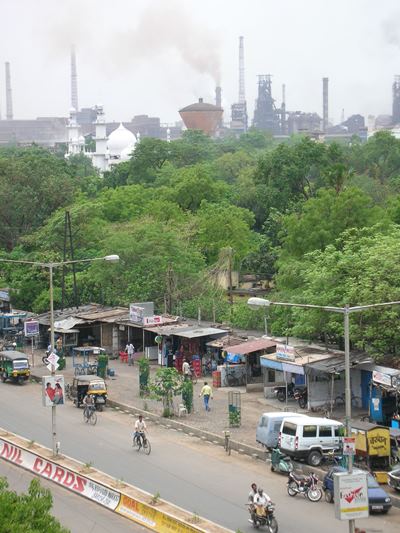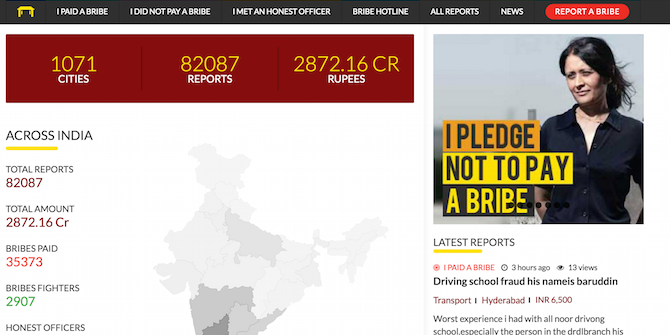 As leaders gather in London for a landmark Anti-Corruption Summit hosted by David Cameron, Andrew Sanchez draws on his research in India to argue the project to eliminate criminal practices that flourish at the margins of capitalist economies is based upon a fundamental misconception. He writes that far from operating at the fringes of the state and economy, corrupt actors are usually enmeshed within the very structures of capitalism.
As leaders gather in London for a landmark Anti-Corruption Summit hosted by David Cameron, Andrew Sanchez draws on his research in India to argue the project to eliminate criminal practices that flourish at the margins of capitalist economies is based upon a fundamental misconception. He writes that far from operating at the fringes of the state and economy, corrupt actors are usually enmeshed within the very structures of capitalism.
This post forms part of our cross-blog Anti-Corruption series. Read further posts here.
Corruption is presently the subject of a great deal of attention, as politicians and lawmakers convene in London for a major summit on the topic. The summit will look at institutional criminality, bribery and nepotism, and ask how things can continue to go so wrong in developing and affluent economies, and in nations of wildly varying cultural characters. It will also consider how to eradicate the criminal practices that ostensibly flourish at the margins of capitalist economies, and call on corporations and other powerful economic actors to find new ways of excluding criminality from their business practices. However, this project is based upon a fundamental misconception, which fails to appreciate that this type of criminality is both a symptom of the basic structures of capitalism, and a technology that supports them.
Since 2006 I have conducted research in Jamshedpur, the industrial company town of the Tata Corporation in eastern India. I have used this work to interrogate the systemic relationship between criminality and modern capitalism, and consider how people uses languages of corruption to articulate their experiences of class. I question the assumption that capitalism is only incidentally related to corruption and violence.

In Jamshedpur, the Tata Corporation has employed a sizeable amount of the local population since the 1900s, and has provided them with housing, healthcare, education and utilities. However, since the liberalisation of the Indian economy 25 years ago, all of those features of urban life have been eroded, as permanent Tata company jobs have been replaced by casual ones. This is the local expression of a global process, by which people in most sectors of the economy are being progressively alienated from job security.
My work in Jamshedpur looks at criminality in trade unions, corporations and the state, and considers what the effect of these processes are on industrial employment security. From there, I explore how these processes are understood and critiqued by industrial workers themselves. My research uses three areas of ethnography to develop a critical political perspective on the relationship between capital and criminality.
First, ethnography on the shopfloor of the Tata Motors automobile plant explores how the global casualisation of labour is experienced by communities of people that formerly enjoyed secure employment. Second, research among trade unions and worker activists considers how the degradation of labour is related to the corruption and failure of collective action. Finally, ethnography among a variety of entrepreneurs and professional criminals considers the broader relationship between capitalism, violence and corruption.
My research in Jamshedpur is the subject of a recent book entitled Criminal Capital: Violence, Corruption and Class in Industrial India (Routledge 2016), which discusses how criminality reshapes and consolidates class positions in modern capitalism. The major conceptual contribution of the work is to redefine the meaning and function of corruption. I show that rather than being an aberrant process that is incidental to the economy, and works through the actions of deviant individuals, corruption is integral to economic processes, and functions through systemic interactions between actors with distinct skills and authorities. The book explains the mechanics of how different types of criminal practice work together, as well as analysing what people say and think about these processes.
Far from operating at the fringes of the state and economy, corrupt actors are usually enmeshed within long-term negotiations with an array of specialists in organised crime, industrial capitalism, financial services, labour contracting, development and the judiciary. These enterprises are as much coercive as they are self-interested, and rely upon the complementary application of violence, threat and the entropy of political representation. While an episodic understanding of corruption would stress the social and political distinctions between specific types of actors, a systemic modelling rather focuses upon the interactions between violent criminals, political representatives and corporations.
Following influential analyses of Post-Soviet criminality (Volkov 2002), organised crime may be understood as a series of on-going business partnerships that not only transgress national, cultural and institutional boundaries, but rather exploit the spaces between them. Following from this observation, what the model of acephalous entrepreneurial networking contributes, is the injunction to trace the functional relationships between quite different kinds of criminal actors, and to theorise how institutional corruption may relate to practices as varied as coercion, economic reform, labour politics and the consolidation of class power. Rather than sporadically diverting capital to the informal peripheries of capitalism and the state, corruption is a systematic series of negotiations between institutional authority, corporations and violence.
I argue against the notion that class struggle is principally enacted within working class political institutions. On the contrary, in contexts of labour reform and civic decline, systemic criminality within corporations and trade unions are acts of elite class struggle in and of themselves, which enable the dispossession of global workforces from employment security and political representation. I suggest that corporations should be regarded as political-economic actors that shape the class experiences of others, by entering into mutually beneficial relationships with criminals. To this extent, the assumption that corporate capital may be trusted to censure its own actions through Corporate Social Responsibility initiatives is based on a basic misunderstanding of what corruption and criminality actually does for capitalism. I argue that conceptual frameworks which stress a clear distinction between licit and illicit forms of influence provide a limited understanding of the operation of modern political economies.
Criminal Capital traces the functional relationships between quite different kinds of criminal actors, and theorises that rather than sporadically diverting capital to the informal peripheries of capitalism and the state, corruption is a systematic series of negotiations between institutional authority, corporations and violence. These criminal practices are instrumental acts of elite class struggle, whose object is accumulation by dispossession.
Note: Criminal Capital: Violence, Corruption and Class in Industrial India (Routledge 2016) is available now on Amazon Kindle and in Hardback.
This post forms part of our Anti-Corruption series, run in partnership with The IGC. Read further posts here. The article gives the views of the author, and not the position of the South Asia @ LSE blog, nor of the London School of Economics. Please read our comments policy before posting.
About the Author
 Andrew Sanchez is Lecturer in Social Anthropology at the University of Kent. He is a specialist on the anthropology of class, economy and corruption. From 2016, he will join the University of Cambridge as Lecturer in Social Anthropology.
Andrew Sanchez is Lecturer in Social Anthropology at the University of Kent. He is a specialist on the anthropology of class, economy and corruption. From 2016, he will join the University of Cambridge as Lecturer in Social Anthropology.








”Corruption is a systematic series of negotiations between institutional authority, corporations and violence. These criminal practices are instrumental acts of elite class struggle, whose object is accumulation by dispossession.”
Above statement is great summary of whole article.
When corrupts will form a policy for the anti corruption, anarchy, violence and inequality is indispensable.
Muhammad Naeem ul Fateh